FCA builds temporary learning spaces in South Sudan in order to improve access to quality education for children and youth in Fangak County. Armed conflict and logistical complications, like fuel shortages, have delayed the implementation of the project.
War in South Sudan has forced numerous children out of school since the conflict erupted in December 2013. FCA strives to improve the access to quality education in Fangak County in Jonglei State with the funding of European Commission Civil Protection and Humanitarian Aid Operations ECHO.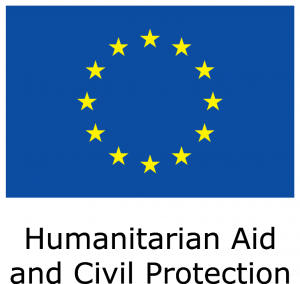
Before the conflict Fangak County had 30 schools. Three out of four were destroyed during fighting, and around 40 per cent of the students haven’t attended school since. Most schools are run under trees.
On average, children walk 35 minutes to school. On the extreme, some children have to walk for an estimated 3 hours to reach the nearest school, contributing to fatigue and high dropout rates.
FCA is now addressing the issue through the construction of ten temporary learning spaces that are located in the payams of Old New Fangak, New Fangak, Toch, Pulita, Manajang and Barboi – all within Fangak County.
The project also aims to provide children in 16 schools with learning materials. Currently only 30 per cent of the students have access to such.
Education services will be improved through intensive teacher training, mentoring and active participation of communities. Parent-Teachers Associations (PTAs) are involved in improving the education infrastructure, including construction of gender-segregated latrines and hand washing facilities, through a cash-for-work component.
Teachers are trained and mentored on teaching methods, child-protection, as well as psycho-social support, while PTAs will be trained in school administration and how to practically apply a child rights approach to administrative structures and school design.
The initial plan was to build semi-permanent learning spaces, but transporting building materials became increasingly difficult because of practicalities like the fuel shortage in Juba early this year. Boats became stranded for weeks and the lack of fuel limited the movement of goods and project staff as well.
FCA solved the issues by resorting to the use of locally available materials. This resulted in a significant reduction in building costs, which translates to three more temporary learning spaces than initially planned being constructed.
Read more about FCA in South Sudan on our country page. Read more about ECHO in our international donors section.
Welcome to new classrooms! Finn Church Aid has constructed school buildings for altogether 44,000 children in Nepal after the 2015 earthquakes.
https://www.youtube.com/watch?v=nIGaFVBvgoY&feature=youtu.be
“I’m not worried about a new earthquake”, says 8-year-old Manjali Shah. “I know what to do.”
Two years ago, massive earthquakes in Nepal destroyed thousands of schools depriving one million children of a place of education. The almost one hundred-year-old school in Shah’s home village Bhimphed was severely damaged in the first earthquake at the end of April, and collapsed completely during an aftershock 17 days later.
Now, the Mahendar High School is operating normally, but instead of the old school building, teaching takes place in new barracks. Shah goes to fourth grade and uses fluent English to ask the Finnish visitors questions about their names and where they live.
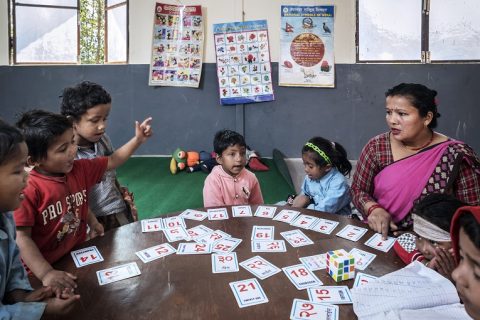
3-4 year olds are learning numbers in English at Shree Bhrikuti Lower Secondary School, one of the schools which FCA has provided with safe school buildings.
“I want to become a teacher so I can share knowledge with others”, Shah says.
When the earthquake took place, Shah was home alone watching TV because her parents were out. She got out unharmed, but the house was heavily damaged. Shah and her family had no choice but to live outside for a month before they were able to return home.
School activities didn’t resume for six weeks after the earthquake. At first, many children didn’t show up for school, says Headmaster Ramji Yadav. Some didn’t know that school activities had resumed. Some feared aftershocks too much to come.
At first, regular teaching was set aside and instead everything in school was based on games and play.
“This was a way of encouraging children to come back to school. We had different fun activities and we didn’t give the children any homework. We also gave the children instructions on what to do during an earthquake.”
Children who attended classes told other children what they had learned about earthquake preparation. This built trust among the other children and three months after the earthquake most of the children were back in school.
334 concrete school buildings
First, temporary classrooms were constructed from bamboo and chicken wire. Then, construction began on semi-permanent structures with concrete walls. School staff is extremely happy with these new buildings.
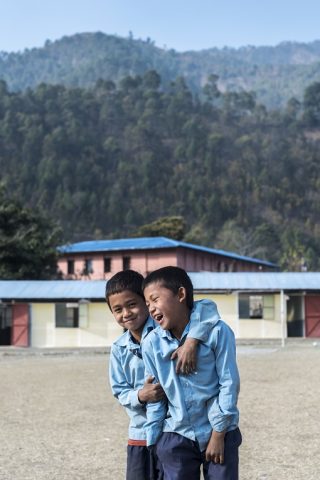
The open field in from of the Mahendar High School is a children’s play field. It will be used as a gathering place in case of a new earthquake.
“We now have a place where the children can come to learn”, Yadav says with pride.
A single building has two classrooms, both of which can hold up to 40 pupils. Small children under 6 years old study around a low standing table, sitting on the floor. The bigger kids study sitting at desks.
The buildings are intended for temporary use for 15 to 20 years. The school in Bhimphed was the first one to have this particular type of semi-permanent school structures.
In total, Finn Church Aid constructs 334 similar semi-permanent school buildings to replace schools collapsed in the earthquakes. This makes FCA the second biggest international organization in Nepal to reconstruct earthquake damaged schools.
The schools now also have water and sanitation facilities like toilets and hand-washing stations. FCA staff has instructed locals on the maintenance of these sanitation facilities and the importance of personal hygiene.
School buildings create a sense of security
Shree Bhrikuti Lower Secondary School is located on a hillside on the outskirts of Thati Pokhari village. As you make the climb up the hill towards the school, around halfway up you hear sounds of rhythmic and upbeat recitation. One class is studying colours in English, and another is going through multiplication tables.
All construction materials for the new structures had to be carried up the hill by hand because there is no road leading up to the school. Before construction was finished, teaching was organised outside on a plaza which, on sunny days, becomes scorching hot. The plaza is where the old school building stood before it collapsed in the earthquake.
Headmaster Tara Jashi says the pupils are relieved to have safe school structures to study in. Teachers at the school have received training on how to prepare for natural disasters. After a couple days of training they are now planning small changes to the school facilities. They are clearly excited to be able to make the school an even safer environment for the children.
The school is important for the entire village community, and the school board has arrived in its entirety to welcome the Finnish visitors.
“By educating children we are helping them reach a good, comfortable and peaceful life”, Jashi says to emphasize the importance of education.
Text: Maija Lappalainen
Photos: Johanna Erjonsalo
FCA Humanitarian Aid and School Construction
28,878 people received Food and Non Food Items
2,000 Emergency Shelters
5 Child friendly spaces
170 Temporary Learning Spaces
334 Semi-permanentSchools
=Safe Learning Spaces for 44,000
556 Semi-permanent Latrines with Hand-washing Facilities
2,880 Educational and Recreational kits
1,750 receive Teacher Training in school-based Disaster Preparedness, Child-centered teaching
12,000 individuals were trained in Psychosocial Support
https://youtu.be/nIGaFVBvgoY
Finn Church Aid (FCA) has been selected to be member of the Inter-Agency Network for Education in Emergencies (INEE) Steering Group. Executive Director Jouni Hemberg is representing FCA in the board beginning from April 2017.
Education in emergency settings matters today more than ever. For instance natural disasters, the Syrian war and continuous crises in the Central African Republic and South Sudan have forced people to leave their homes, and schools have been closed or destroyed. As a result, millions of children and youth in conflict affected areas are out of school.
Right to Quality Education
- Finn Church Aid (FCA) improves quality learning in Education in Emergencies building on the knowhow of Finland’s highly trained teachers, strategic partnerships and ICT for development.
- Through Education in Emergencies, FCA provides access to learner-friendly and safe learning environments, and to quality learning opportunities for children, adolescent and youth.
- FCA promotes practical ways of ensuring the accessibility and quality of vocational education.
- FCA works in the field of education in emergencies in 9 countries as well as on a global level through e.g. INEE and the Education Cluster.
- Learn more about FCA’s education work here.
“In a crisis situation, getting schools up and running as fast as possible has remarkable significance for the safety and recovery of children and youth. Schools and the psychosocial support provided in schools can considerably help children and youth to restore a sense of normality, dignity and hope”, says Jouni Hemberg.
“FCA specialises in working with youth. There are many organisations focusing on children, but not as many focus on youth in particular. There’s also a rapidly growing need for vocational education. These are areas that FCA can bring added value to in the Steering Group and the work of INEE”, says Hemberg.
The Steering Group of INEE is comprised of UN agencies (UNESCO, UNHCR, UNICEF) as permanent members, as well as international non-governmental organisations and donor agencies that serve in four year periods. Steering Group members commit to promoting and advocating increased support for education in emergencies and recovery. They also play a role in seeking funding for INEE.
“The membership of INEE gives FCA an opportunity to influence the development of education from a global perspective”, Hemberg adds.
FCA has been a member of INEE’s Standards and Practice Working Group since 2015 and the network’s Advocacy Working Group since 2016. It has participated in developing practical tools and guidance to organisations that respond to education in emergencies.
A remarkable development work is currently taking place in developing guidance for integrating psychosocial support into education responses in crisis situations. This process will be finalised by the end of May.
“Currently, there‘s very little guidance on psychosocial support in the education sector. Yet, the teacher’s role is essential in improving the well-being of students and building resilience. In a crisis situation teachers themselves are also affected and need support to be able to improve the well-being of children and youth”, says Minna Peltola, Senior Adviser on Education at FCA.
INEE is a network of more than 12,000 individual members and 130 partner organisations in 170 countries. INEE serves its members through community building, advocating, and providing members with the resources and support they need to carry out their work on Education in Emergencies.
Eritrea is in need of quality teachers, particularly in rural regions, where up to 80 percent of the country’s population live. Certain elements of the Finnish education system could benefit Eritrea as well.
An English class is under way for second graders at the Sewra primary school in the Eritrean capital Asmara. “Jerry can, jerry can” the children repeat eagerly after the teacher.
The teacher holds up a picture of the container and asks the children what it is. The little ones answer in their native tongue Tigrinya.
“No, a jerry can”, the teacher repeats patiently and a choir of voices starts chanting once more from the beginning.
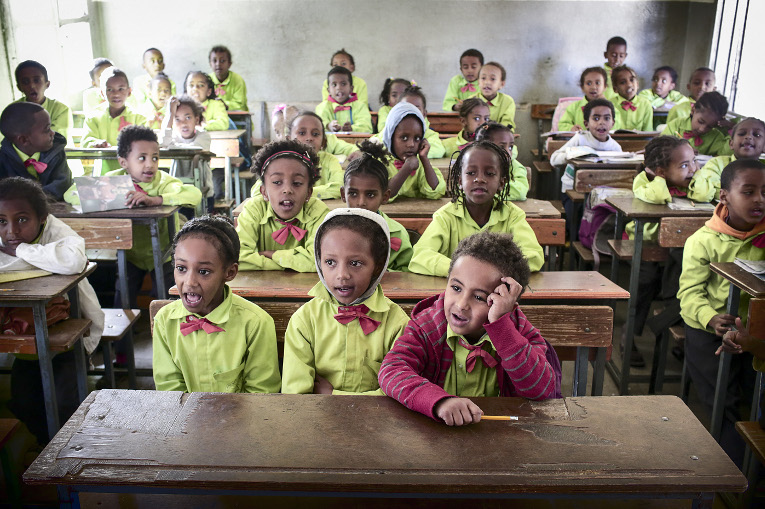
Pupils at class in Sewra Elementary School in Asmara.
Teaching in Eritrea relies on very traditional methods. Teachers write down their weekly schedules in a notebook, and on Fridays the principal approves schedules for the coming week. Inspectors visit schools regularly to make sure, among other things, that teachers are maintaining their schedules.
A single class can hold up to 60 students. Skilled teachers are in high demand.
All Eritrean youth spend their last year of school at the military training camp in Sawa, in the Gash-Barka region. Their future is highly dependent on their performance in the final exams. Study places are allocated based on success in these exams. Until recently, those with the lowest scores have been chosen for teacher training. The teaching profession has not been held in high regard in Eritrea.
Eritrea is investing in teacher training
Eritrea is developing its teacher training and national curriculum to ensure children and youth receive the skills they need in order to succeed in the future. Finn Church Aid has supported this work from 2015.
Teacher trainees are chosen with a new method emphasising school success and motivation. Motivation is determined by individual interviews. The first teacher trainees chosen with this method began their studies last autumn. They will spend their last year of high-school at a teacher training institute instead of the Sawa military camp.
In two years they will graduate as primary school teachers. Those with the best scores can continue their studies.
“Being a teacher wasn’t exactly my dream. I dreamt of studying chemistry, but my father is a teacher and I spoke with him. Eritrea needs teachers and I thought I could become one”, says 18-year-old Ariam Yosief, who was one of the students who started their studies at the Asmara Community College of Education (ACCE) last autumn.
“It’s not easy to give up on your dreams, but I want to help others. I have also found good friends here”, she says.
“Next we need to study how well the new selection process is working”, says Finn Church Aid Education Specialist Hanna Posti-Ahokas.
Development cannot be imported
The campus of the Eritrean Institute of Technology (EIT) is located in the countryside about 25 kilometres from Asmara. Facilities there are modest: students live in barracks on campus. The institute has a computer room, but the internet connection is slow and unreliable.
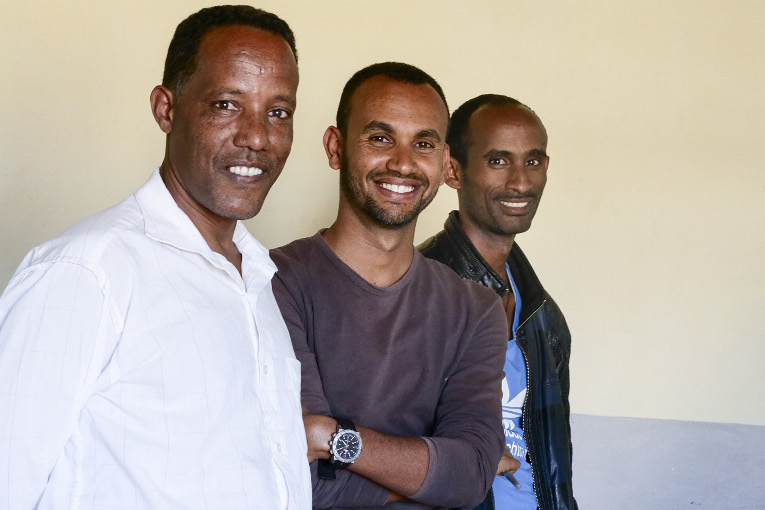
“We understand that we still have plenty to do to develop teaching. At the same time, we are aware of how much we can do”, says Khalid Idris (centre), dean of the EIT’s College of Education. Also on the photo are Zecarias Zemichael (left) and Petros Woldu. Idris, Zecmichael and Woldu form the coordinating team at EIT for the cooperation with FCA.
“You can’t have development without research and development cannot be imported”, says Zecarias Zemichael, teacher and researcher at the EIT’s Department of Psychology.
“At the moment, we are working on a mentoring programme, because sharing experiences between teachers is important. We encourage our staff to take part in workshops and develop their professional skills”, Zecarias Zemichael says.
Cooperation motivates personal professional development
Eritrea is one of the poorest countries in Africa. 40 per cent of the population live in rural regions that lack proper roads, not to mention electricity and sewers. Even with lacking resources and power outages at the teacher training institute, educators remain motivated to develop themselves and teacher training.
“I feel privileged when communicating with my students. It makes me feel like I’m doing important work”, says Amanuel Yosief, one of the teachers at the ACCE.
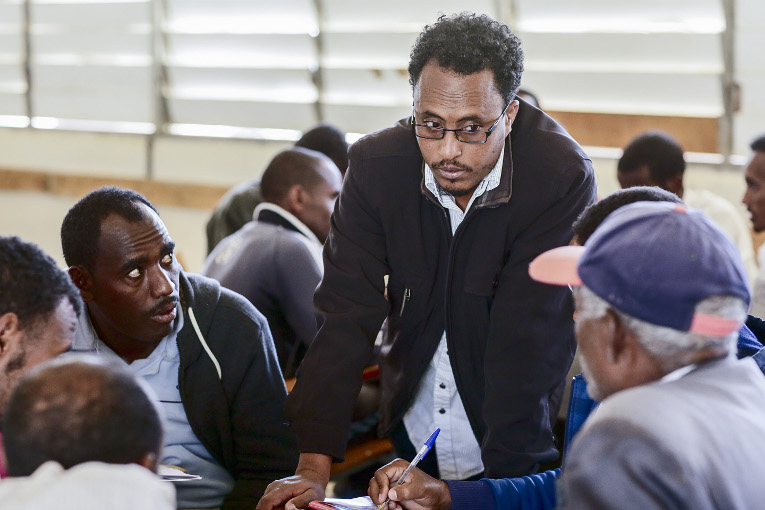
“The students are a resource themselves, and they give me the opportunity to learn new things as well”, says Amanuel Yosief.
Working with Finn Church Aid has provided Yosief with tools to develop his craft. Workshops and group discussions have made him think about his own teaching and fuelled his motivation.
“Teaching in Eritrea is very theoretical. It should be made more practical and find ways of linking it to students’ personal experiences.”
Yosief was one of five teacher trainers who visited Finland in October to familiarise themselves with the Finnish education system.
“Finnish teachers were motivated and responsible, and this reflected in the children as well. The children had confidence in themselves and worked independently. For example, in an English class the students could choose how to study; independently or in a group”, Yosief says.
FCA’s cooperation with Eritrean teacher training institutions and education officials has continued for two years.
“Our expectations were very high and we are still only in the beginning. The resource-centre, where we have computers and literature, is a concrete and important achievement in our cooperation. I am very optimistic about the future”, Zecarias Zemichael says.
FCA activities in Eritrea
FCA activities include:
- Developing teacher training (for example through pedagogic cafés, action research, curriculum development and Teachers without Borders volunteers).
- Providing support to the National Innovation Centre.
- Promoting dialogue between Finnish and Eritrean youth organisations.
- Plans have also been made to engage in the development of vocational education.
Finn Church Aid is one of the few international NGOs operating in Eritrea.
Text: Minna Elo
Photos: Jukka Gröndahl
Tu-Myaung Village in Myanmar’s Irrawaddy Delta was hit hard by cyclone Nargis in 2008. Nwe Kyi was thankful her family of six survived the disaster.
But life was harsh. Although her husband Ko* Maung Kyi, 50, worked hard as a laborer in paddy fields and Daw** Nwe Kyi, 49, exhausted herself for a meager wage transplanting rice seedlings and reaping paddy, they often could not even afford daily meals for their three daughters, son and themselves. To make matters worse Nwe Kyi had to worry for her daughters because after the disaster human traffickers tried to lure young women away.
Nwe Kyi had just before Nargis borrowed money to invest in a coconut business. But the ship on which she had sent the coconuts to Yangon got hit by Nargis. She and her family were left homeless while having to repay the local loan shark at a steep interest rate of 10%. The family survived on food aid from local and international charities.
Saving started with 75 cents
A first attempt of the village to start a women’s group in 2009 failed, because no one was able to make any savings while having to rebuild their houses under a lot of stress and post-Nargis traumas. In 2014 they succeeded and now Ngwe Thawtar (Silver Moon) has seventeen members who have been working hard, with support of the Women’s Bank, to make it a success.
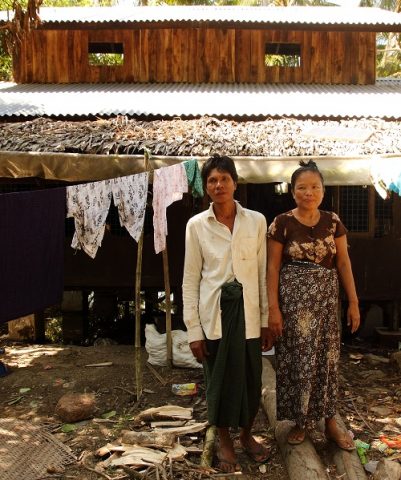
Nwe Kyi and Maung Kyi’s home is a proper wooden house.
Nwe Kyi started saving 1,000 kyats (± 0,75€) a month and invested a first loan of 100,000 kyat in two pigs.
“A few months later I sold them for 400,000 making a profit of 300,000! I invested the profit to grow paddy and made a 500,000 profit. I then borrowed 300,000 more to continue growing paddy. And now we built this house!” She proudly points at her brand new wooden house.
“We also have 180 ducks providing us a daily income of minimum 4000 kyat from selling eggs. I hope to open my own grocery store in the near future.
Most importantly, while older children could not stay in school because they had to help the family, their youngest daughter is now attending 7th grade.
“We can support her without difficulty to finish her education. Only education can save our children from poverty.”
“I know how to protect my daughters and granddaughters”
Women’s Bank with its Myanmar partner LWF provided Daw Nwe Kyi not only a new livelihood; she also gained skills and knowledge. “I never thought I would ever receive in my life”.
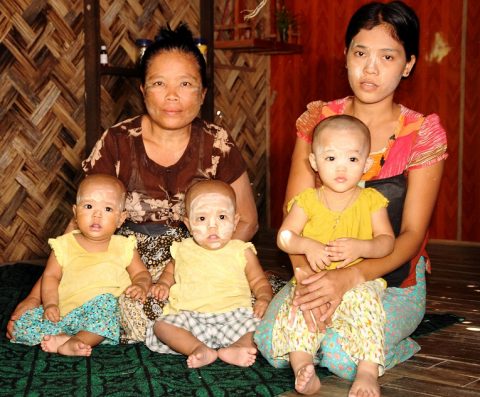
Nwe Kyi with one of her daughters and three granddaughters.
Her favorite LWF trainings include Disaster Management and Preparedness, Maternal and Child Health and, especially, the Anti-Human Trafficking training given by a police official sponsored by LWF.
“After Nargis I was always worried whenever I saw strangers in our village. We heard that human traffickers frequented villages to persuade young women to come with them, promising lucrative salaries. But after attending these trainings I now know how to protect my family, especially my daughters and three granddaughters”.
Text: Khin Moe Moe Aung
Photos: Myo Thame / c4dm ltd Myanmar
*Ko = Mr. (honorific)
**Daw = Ms. (honorific)
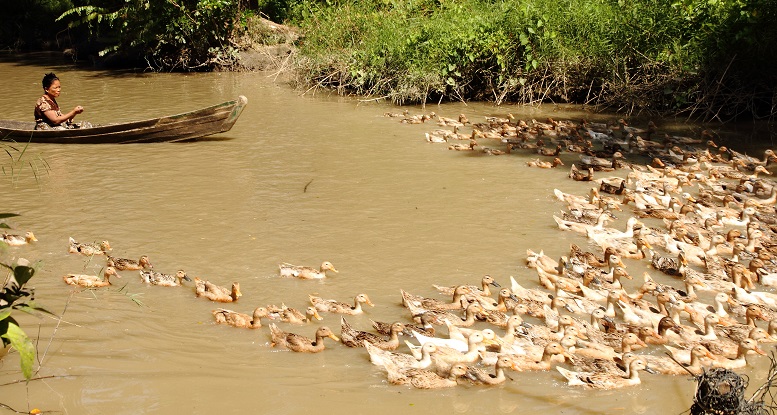
Daw Nwe Kyi and her ducks.
Today the international community discussed the humanitarian crisis in Syria in Helsinki. In the Supporting Syrians conference, UN and partners launched the Regional Refugee and Resilience Plan (3RP) for 2017-2018. Education and employment of youth cannot be stressed enough.
Unemployment rates of youth in Syria and the neighboring countries are very high and a lack of future perspectives for youth is a fuel for instability, noted the recent Arab Human Development Report by UNDP. There are 2.7 million adolescents in Syria in need of assistance.
“It’s very welcome that both education and economic opportunities are included in the plan. However, more attention must be paid to linking these two aspects of the response to each other. We cannot invest too much in education and youth employment”, says Tomi Järvinen, Director of International Programme at Finn Church Aid.
Syrian children and youth have the right to quality education and livelihoods. Therefore, they should be provided for uninterrupted educational paths including secondary, vocational and higher education.
To achieve that, teacher training needs extra support. Dialogue with the private sector needs to be continued to ensure the relevance of the education for labor market needs. In addition, vocational and entrepreneurial training as well as funding for start-up entrepreneurs must be increased. In the same time, bureaucratic barriers hindering their aspirations have to be deconstructed. Children and youth in vulnerable situations also need psycho-social support.
“It is crucial to support employment of both Syrian refugees and host community youth at the risk of marginalization”, stresses Järvinen.
”Employment will also enable a flexible return home for refugees. They may have been able to save money maintain their working ability and possibly learn new skills.”
”It seems that both donors and Syrians are seeking new ways to earn a living, organise education and create jobs. Glimpses of hope are also in the air. Donors have also taken into account that we can learn from the survival mechanisms of the local communities.”
The education of Syrian children and youth cannot wait until the conflict ends; that the parties will be able to negotiate peace and Syrians will start the reconstruction. 40 per cent of adolescent children and youth are unable to go to school this winter, and the longer they wait the harder it is to go back – if not impossible.
Finn Church Aid supports Syrian refugees at refugee camps and surrounding host communities in Jordan. We provide youth and young adults with English and IT training as well as various professional skills training. We also provide young adults with recreational activities, such as sports and a circus school, which are intended to promote the psychosocial wellbeing of these young people who find themselves in a difficult situation.
In Syria we support food aid and education for internally displaced people through our partner International Orthodox Christian Charities (IOCC).
For further information:
Tomi Järvinen, Director of International Programme, Finn Church Aid, tel. +358 40 641 8209
The war in Syria will soon be entering it seventh year. In order for the international community to best support the resilience of the Syrian people in the midst of the conflict, it is crucial that attention is paid to social cohesion and supporting the Syrian’s own plans and actors. This was the main message of seven civil society organisations at the 23 January conference titled ‘How to build bottom-up community resilience in Syria?’ The event took place in connection with an international conference on Syria hosted by Finland on 24 January, where the United Nations will announce its plans for Syria concerning humanitarian aid and refugees.
“Strengthening the social cohesion of the Syrian people should be part of all aid in Syria. There is a need for common spaces where all Syrians can work together regardless of what groups they belong to. There is a need for cooperation between Syrian cities. At urban level there must be work with both local communities and internally displaced persons,” said Eva Zidan from Syria, coordinator at the civil society organisation COSV (Coordinamento delle Organizzazzione per il Servizio Volontario of Italy) in Syria.
The conference also pointed out that the international community and donor countries have furthered the rupture of Syria’s social cohesion by supporting only particular local actors. Another problem is that Syrians have not been included enough in planning and implementing humanitarian assistance. The international community has talked about Syrians but not with Syrians themselves. Decisions have been made on a top-down basis, without taking account of local level perspectives. And yet Syrians know best about local problems and how to solve them.
Syria Crisis Policy and Campaigns Advisor Alexandra Saieh from Oxfam said, “Women are taking on additional responsibilities but they’re still the least consulted. Women’s perspectives must be integrated for bottom up community resilience. In addition, donors and international organizations should scale up long term, flexible funding directly to local civil society from Syria, so that they can plan for and own the future.”
Zedoun Alzoubi, the CEO of UOSSM (Union of Medical Care and Relief Organisations), which carries out humanitarian work in Syria stressed the need for cooperation between civil society and local governance institutions: “Local cooperation between civil society locally and local administrative structures can weaken the influence of militias and combat radicalisation.”
The conference also discussed the importance of education and livelihood in ensuring that Syrian resilience and reconstruction succeeds.
The conference was organised by the Crisis Management Initiative, Felm, Fida International, Finn Church Aid, Kehys – The Finnish NGDO Platform to the EU, Kepa and Save the Children Finland.
Last week, Finnish CSOs issued a statement in which they called on the UN to involve Syrian local communities, civil society and local government in all operations conducted in Syria. In recent days, more signatories have endorsed the statement, and it has now been signed by 28 civil society organisations.
Statement by Finnish CSOs and list of signatories
Further information:
• Crisis Management Initiative (CMI): Maruan El-Krekshi, Programme Director for Middle East and North Africa, maruan.elkrekshi@cmi.fi, +358 40 747 4530.
• Felm: Minna Saarnivaara, Syria Initiative Project Manager, minna.saarnivaara@felm.org, +358 50 517 8396.
• Fida International: Ismo Salerto, Humanitarian Aid Manager, ismo.salerto@fida.info, +358 40 829 2206.
• Finn Church Aid: Tomi Järvinen, Director of International Cooperation, tomi.jarvinen@kirkonulkomaanapu.fi +358 40 641 8209.
• Kehys – The Finnish NGDO Platform to the EU: Rilli Lappalainen, Secretary General, rilli.lappalainen@kehys.fi, +358 50 561 3456.
• Kepa: Outi Hakkarainen, Policy Adviser, outi.hakkarainen@kepa.fi, +358 50 317 6728.
• Save the Children Finland: Sanna Vesikansa, Advocacy and Policy Adviser, sanna.vesikansa@pelastakaalapset.fi +358 50 433 1382.
Finn Church Aid (FCA) has trained the first ever Career Counsellors for schools in Cambodia. As a result, career counselling is incorporated in the national curriculum and the project expands throughout the country.
Fifteen teachers and education staff were trained as the first ever career counsellors in Cambodia last year. They have since started working in schools in the Battambang region in the northwest of the country.
Their contribution means that 2,600 secondary school students (1,345 girls and 1,255 boys) at risk of dropping out of school have access to career counselling services in Cambodia.
This unique pilot initiative for career counselling was developed between FCA, Teachers without Borders Finland and the Cambodian Ministry of Education, Youth and Sports.
Previously, there was no career counselling in Cambodian schools. FCA responded to this significant gap in the Cambodian education sector with the added value of Finnish expertise.
The pilot fulfilled its objective when the Cambodian Ministry of Education, Youth and Sports incorporated career counselling in the national curriculum. The Ministry’s ambitious plan to train career counsellors for all Secondary and High Schools in the course of two years has been set to begin in October 2016 with the training of trainers.
The schools in which the first counsellors have worked, have reported a dramatic decrease in dropouts, says FCA’s technical adviser Sari Turunen, who has been involved in the training of the first counsellors and prepared a training manual.
“In Cambodia, schools don’t really have an idea what the students are studying for. Career counselling has been found to be very meaningful”, Turunen says.
The Finnish trainers of the pilot project carried out many new things, which differ from the Cambodian culture. The group did exposure visits at companies and invited a bank manager to talk about the banking business. The trainees oriented themselves towards finding a linkage between education and working life.
“I’m very happy to know that the new career counsellors are now taking their students to similar exposure visits”, Turunen says.
Career counselling is a popular subject in the schools involved in the pilot, also due to the new, participatory teaching methods that the counsellors have adapted during their training. The work has led to important changes in the students’ attitudes towards the school, their studies and their future, as well as an increased cooperation between schools and parents.
FCA’s Right to Quality Education work builds on the knowhow of Finland’s highly trained teachers. FCA prioritises the support to Teacher Education, as teachers are the most important resource for improving learning.
More information:
Saara Lehmuskoski, Cambodia Country Manager, Finn Church Aid, Tel.+ 855 12 201 799, saara.lehmuskoski(at)kua.fi
Research after research shows that teachers are prone to teach the way they were taught at school. If the educational system is to be developed, then, it’ll be critical to expose teachers to learning experiences that support the desired change. The Eritrean National Curriculum emphasizes on a learner-centered and interactive approach to teaching, but teachers generally feel unconfident with such methodologies, as many are not very familiar with them.
Teacher education is quite naturally a stage where both future teachers and teachers upgrading their qualifications should be able to build the familiarity and confidence with the kinds of approaches they’re expected to use. A common problem, well formulated by a Kenyan teacher, is that “they always use these words – ‘participation’ and ‘active learning’ – and tell us we should do this and why don’t we, but these are words they say, not things they do”.
Currently, Eritrean elementary teacher education has a somewhat clear focus on theoretical content knowledge. In the absence of ample studies on pedagogical methodology, it is particularly important that the didactics is interwoven in all education they receive. Thus, in order to promote a more learning-centered approach to teaching, the teacher educators’ skills in such methodologies are indispensable.
In May 2016, a two-workshop training in Learner-Centered Methodology for Educators was organized by FCA in Asmara Community College of Education. The twelve participants were first introduced to four different activities requiring active student participation. All activities – speed dating, live bingo, work stations and critically discussing a video material – were tested together.
After the first workshop of the training, participants’ assignment was to modify one or more of the activities, and to try it with one or more of their classes. During the second workshop the participants reported on their experiments.
Inspired by speed-dating rules, everyone got an identity card according to which they introduced themselves to each other during three-minute meetings. A mathematics teacher inventively modified this task into a cooperative problem-solving task.
Live bingo sent the participants looking for people who matched qualities on a bingo sheet, like “Knows how to bake bread”. In a version created by an English teacher, the bingo activity was used to studying tenses with class mates.
In the training, three work stations with different activities were used, with the teams rotating from one station to the next in 10 minutes intervals. This type of activity was used by a history teacher for revision before an exam.
Most of the teacher educators had not used videos in their teaching and told that they were inspired by the idea of using video material as a conversation starter. A chemistry teacher worked together with the College’s digital library to screen video introduction to a lesson.
Judging by the reports and feedback on the training, most of the participants gained a lot from the hands-on activities. They showed great creativity and commitment in doing the assignment, and some did up to three different experiments. The teacher educators were glad to gain practical examples and practice on how to adjust activities for their own needs. Also, they were excited to see how actively their students had been working on the activities.
This training as such is a rather light package, a fact that comes with both strengths and disadvantages. On one hand, the training can be led by a single trainer and organized time-wise quite flexibly. On the other hand, more practice on learning-centeredness is needed, as the participant feedback also clearly indicated. The material package created for the training is freely available for further use and modification for interested trainers. Perhaps even one of the participants will lead the training for his or her colleagues one day!
1 Where it’s needed most: Quality professional development for all teachers – Invest in high-quality teacher educators (INEE, 2015)
Text by Katri Meriläinen
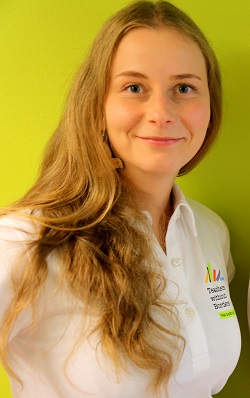
Katri Meriläinen holds an MA in Teacher Education and specialises in English and Biology. She offers diverse experience in teacher education and integration of the arts in learning. Meriläinen specialises in pedagogical uses of information and communication technologies. Her passion for teacher education has led her to pursue international opportunities, and in 2009 she worked on developing an education programme for street children in Kolkata, India. Recently, Meriläinen has completed courses in Global Education and Education Quality Assessment.









